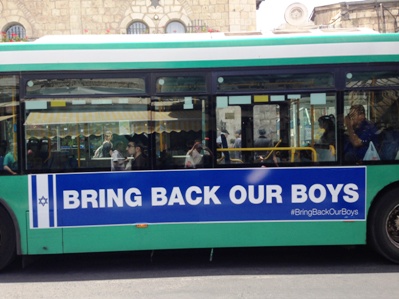
All sides have jumped on this tragedy to further
their own political agendas.
By Sara Yael Hirschhorn
The three yeshiva students waiting at the hitchhiking stop just wanted to get home for the weekend. But from the moment Naftali Frenkel, Gilad Shaar and Eyal Yifrach were seized by kidnappers, politicians from every imaginable faction were ready to hijack the human drama for demagoguery and to manipulate the incident to serve agendas both internal and external.
Within days of the kidnapping, Operation Brother’s Keeper—the name given to the Israel Defense Forces’ attempts to retrieve the boys—expanded from a search and rescue operation to what might almost be termed a regime change mission in the West Bank.
Israeli Prime Minister Benjamin Netanyahu emphasized in his first public statement two days into the crisis that those responsible for the kidnapping would “pay a heavy price” and that he blamed Hamas, against whom he claimed to have credible evidence as the perpetrators of the abduction. (Others expressed doubt as to whether the kidnapping was a coordinated attack from the top—plausible enough, since the field manual for the al-Qassam Brigades, Hamas’s military wing, has endorsed kidnapping as a key strategy, and the IDF has foiled more than 48 attempts since 2013 alone—or a mission carried out by an independent cell of operatives.)
Netanyahu declared that he held Palestinian Authority president Mahmoud Abbas ultimately responsible for the abduction—despite Abbas’s disavowal of kidnapping as a tactic and admission of ultimate responsibility to return the boys home safely. It seemed apparent that attacks in the West Bank were intended to punish Fatah leadership for entering into a unity pact with Hamas following the collapse of peace negotiations in previous weeks. But it was soon clear that the Netanyahu government was actually using its incursions to try to stabilize the Palestinian Authority, by removing any challenge from Hamas activists in the West Bank and containing them in the Gaza Strip.
It swiftly emerged that military, police and intelligence operations in the West Bank were exploiting the kidnappings as an opportunity for a kind of housecleaning operation in the West Bank of Hamas leadership and resources—bombing supposed headquarters, detaining and questioning activists and their families and rounding up previously released political prisoners. By late June, according to statistics compiled by the website +972, the IDF had arrested nearly 400 West Bank residents and raided 1,150 institutions, besides putting 200,000 Hebron residents under lockdown. Some groups suggested the army had crossed the line into inflicting collective punishment.
Some articles in the Arab press suggested that the Israeli government had fabricated the abduction in order to facilitate this agenda. Statements by unnamed IDF officers in Israeli newspapers, meanwhile, offered a more plausible, if cynical, variation: that the government and military already had plans to conduct major operations and were merely waiting for the appropriate provocation. Of course, while Abbas benefits from allowing the Israeli army to destroy Hamas infrastructure, the gambit could also backfire and further entrench Hamas forces.
The Israeli right seems poised to continue to exploit the kidnapping in service of accelerating its agenda of annexing Area C, the administrative region of the West Bank where the kidnapping took place. In the absence of a two-state solution and in the wake of the kidnapping, this policy option—once seemingly extreme—has increasingly emerged as mainstream discourse, and could be implemented sooner rather than later. In fact, the weekend after the kidnapping, MK Ayelet Shaked from the Jewish Home party reasserted her suggestion to annex Area C as a deterrent to future abductions.
The kidnapping has also, of course, been ransomed for internal Israeli politics on both left and right. From the early hours, even prayer became politicized, as politicians and public figures on both left and right joined the thousands thronging the Kotel, offering benedictions to bolster their claims to be the most active moral voice on the abduction.
On the left, doves have connected the kidnapping to the collapse of the peace process, recalling Martin Luther King Jr.’s admonition that “those that make peaceful revolution impossible make violent revolution inevitable” and arguing that the administration’s failure to reach a peace agreement has left the Palestinian community frustrated and Israel at the mercy of what are merely its venting mechanisms.
Meanwhile, hawks harangue the Netanyahu government for having released prisoners in the Shalit kidnapping deal and on other occasions, saying this encourages further terrorist activities. As if in response to this argument, in the latest sweeps, the IDF has picked up dozens of released prisoners, including those freed under peace negotiations this spring.
Does it even need to be said that this is no way to make policy? Without an open and honest debate on the kidnapping and the response to it, it will truly be Israeli and Palestinian democracy that has been abducted by terrorist activity.
Sara Hirschhorn is University Research Lecturer and Sidney Brichto Fellow in Israel Studies, University of Oxford, and the author of City on a Hilltop: American Jews and the Israeli Settler Movement Since 1967, forthcoming from Harvard University Press.


